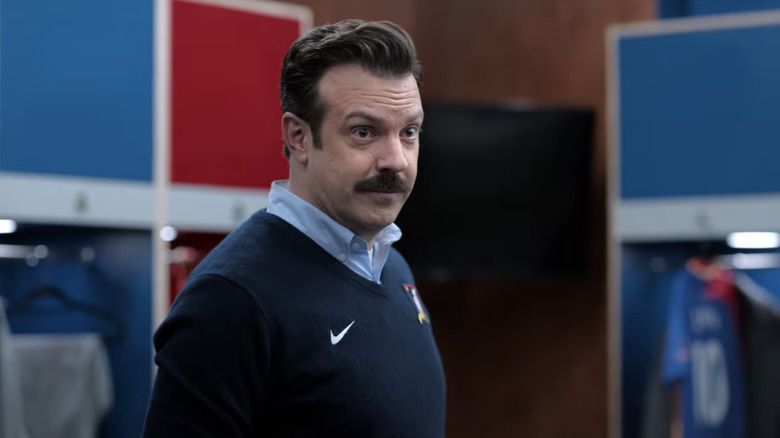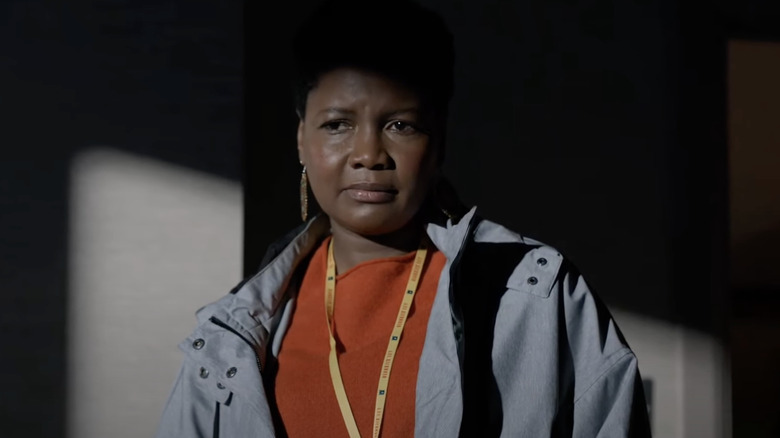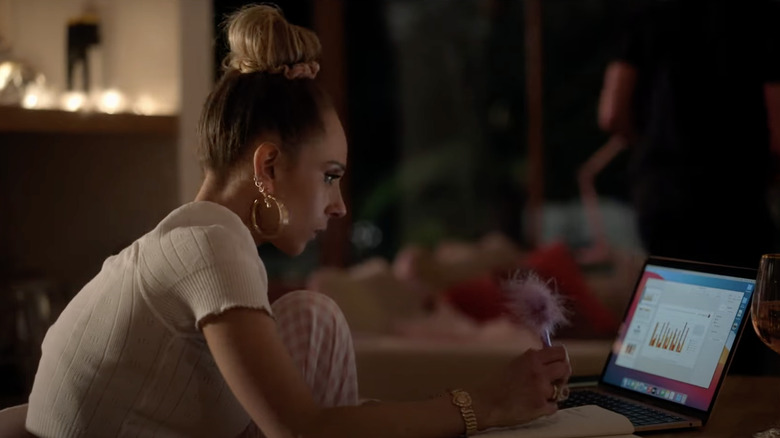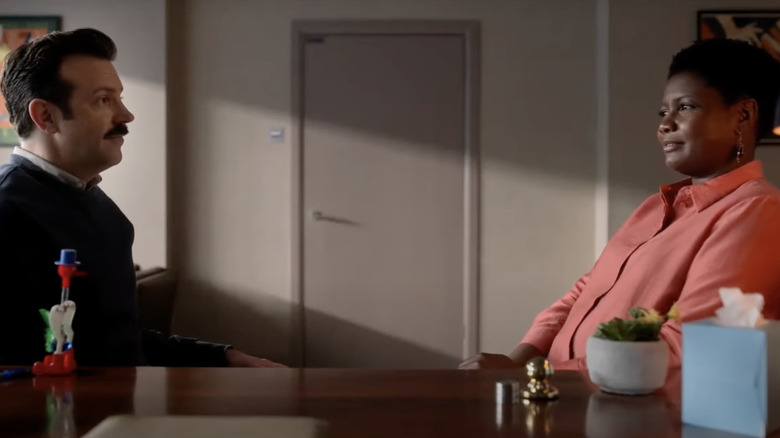Ted Lasso Season 3 Wisely Keeps Season 2's Best Subplot In The Mix
This post contains spoilers for Ted Lasso, season 3, episode 1, "Feels like Ted Spirit."
In its third season, "Ted Lasso" continues juggling a big cast of supporting characters, any one of whom might be a candidate to continue the Lasso-verse after the series ends with a spin-off. However, the season 3 premiere begins with Ted (Jason Sudeikis) calling up one character who was seemingly gone after season 2: sports psychologist Sharon Fieldstone (Sarah Niles).
The moment comes right after Ted has seen his son off at the airport. This leaves Ted alone again in his fish-out-of-water life as an American football coach holding a soccer team together in England. He and Dr. Sharon had already said their goodbyes in season 2 as she moved on to support another team, but Ted still needs a lifeline, and having him reach out to her right before the opening credits of season 3 shows that he has grown as a character.
In 2022, Niles told E! News that fan reception to Dr. Sharon was initially mixed when she joined "Ted Lasso" in season 2, but that "everybody grew to love her, because she's bringing out the best in Ted." Part of the reason that some viewers may have been reluctant to embrace Dr. Sharon is that Ted himself held the same attitude toward her and her entire profession as a therapist.
Dr. Sharon has a more serious demeanor than most other characters; she's one of the few who remains unmoved by Ted's unflappable good cheer. However, Ted kept coming back to his therapy sessions with her because he's not a quitter, and eventually, in the season 2 episode, "No Weddings and a Funeral," we learned the real reason he is the way he is, as he began to reckon with the painful secret of his father's suicide.
Is Ted Lasso really a comedy?
"Ted Lasso" won the Emmy Award for Outstanding Comedy Series for two consecutive years, and in season 1, it did follow the half-hour comedy format. However, in the back half of season 2, as Ted suffered panic attacks and became more introspective in his sessions with Dr. Sharon, episode lengths began creeping up over the 40-minute mark, to the point where the show now has the rhythms and runtime of an hour-long drama, minus commercials. This raises the question: is "Ted Lasso" really a comedy, or is it a feel-good character drama?
Humor is subjective, of course, and there is such a thing as dramedy, but you don't have to look far to find evidence of the "Ted Lasso" backlash, part of which stemmed from the slowness of season 2. There were still some funny moments scattered throughout the season, like the emergence of Ted's "Led Tasso" alter ago on the field during soccer practice, but much of Ted's humor is reliant on pop culture references, which Dr. Sharon identifies as a defense mechanism.
"He refuses to open up," she says at one point in season 2. "And when he gets anywhere close to being vulnerable, he fires off a zinger or some obscure reference to something very specific to a 40-year-old white man from middle America."
One way to read this would be to see it as a simple instance of the show being too self-aware and owning its own flaws and contradictions, like when Ted opines wholesomely, "People say cuss words when they don't know the right ones to use to express themselves" (despite the writing for his TV show being littered with cussing). Another way to read it would be to say that the form of the show has evolved along with Ted.
Sex and the City with a mustache
In "Ted Lasso" season 3, we hear Dr. Sharon in voiceover before we see her on the other end of the iPhone line, upholding the obligatory Apple product placement. Her disembodied voice guides us into the premiere with Ted, almost as if it's his inner monologue.
Showing a character's self-talk is easier to do in writing than it is onscreen. In "Sex and the City," a show "Ted Lasso" references more than once, Sarah Jessica Parker's protagonist, Carrie Bradshaw, was able to do a lot of soul-searching in voiceover because she was a newspaper columnist and her narration represented her train of thought while writing. "Ted Lasso" employs a more traditional screenwriting trick, using dialogue and the character of Dr. Sharon as a springboard for Ted's thoughts.
In the premiere, when Dr. Sharon asks Ted the meta question of how he feels about the upcoming season (which could mean season 3 and/or the soccer season), Ted openly alludes to the idea that he's still running from something, perhaps the pain of his divorce, by remaining in England. "I guess I do sometimes wonder what the heck I'm still doing here," he says. "I mean, I know why I came, but it's the, uh, sticking around I can't quite figure out."
In season 2, we saw Keeley (Juno Temple) watching "Sex and the City," as if to flag its influence, but we also saw Ted watching the Christmas classic "It's a Wonderful Life." There was even a recent live read of "It's A Wonderful Life" starring Jason Sudekis as George Bailey, the character played by Jimmy Stewart in the film. While much older, that film still wasn't afraid to go dark (like when Ted touts rom-communism and the middle chapter of fairy tales being a "dark forest") before arriving back at a feel-good place.
Ending things the Lasso way
Ted Lasso seems primed to have a similar arc of coming back from the darkness in season 3, as he comes to grips further with his father's suicide, his failed marriage, and the unlikelihood of his team winning "the whole f***ing thing" in the Premier League. If and when his story does end, even if the writers of "Ted Lasso" say the Lasso-verse could continue after the series ends, then keeping the Dr. Sharon subplot alive could help keep Ted anchored to the lessons of season 2 as he moves toward the end of his story as sure-footedly as he once sprang for the door of her office. Even if he's just occasionally checking in with her, as he did in the premiere, it would give Ted's overall arc some connective issue.
We know now, after his breakthrough therapy session with Dr. Sharon in "No Weddings and a Funeral," that Ted's kindness toward others originates from a deep empathy toward the pain other people might be going through on a daily basis. Yet there are times when his boundless optimism slips into denial, which may be why Dr. Sharon was so unimpressed with it in the first place.
Lowering that false front and continuing to work through his issues with Dr. Sharon could eventually get Ted to realize that he needs to move back to America and confront what he was running from there. After all, the fabled "Lasso Way" always has put personal growth above winning, and with its use of the Rolling Stones song, "You Can't Always Get What You Want," the season 3 trailer indicated outright that Ted and friends might be getting less of what they want and more of what they need this season.
New episodes of "Ted Lasso" air Wednesdays on Apple TV+.



